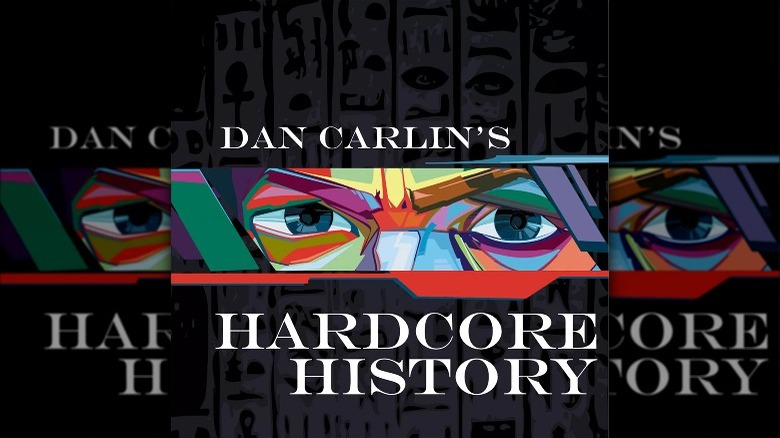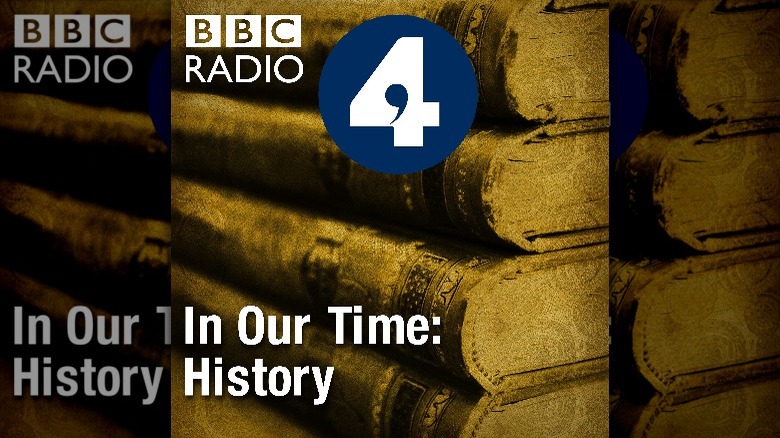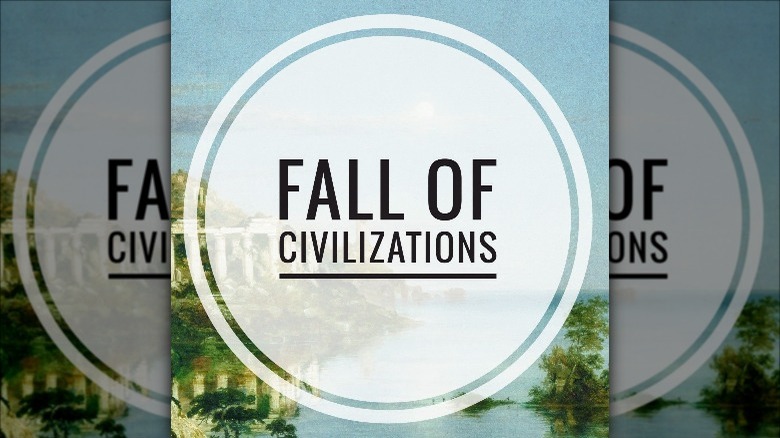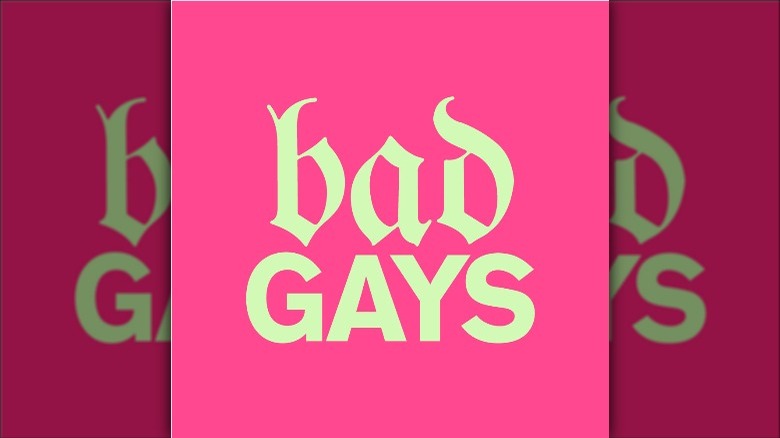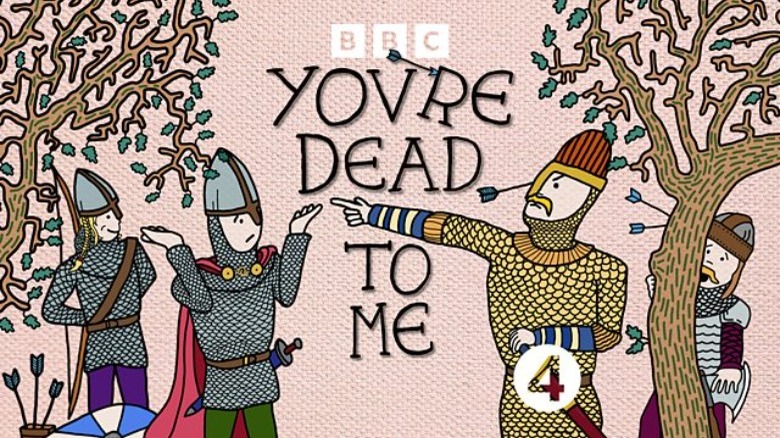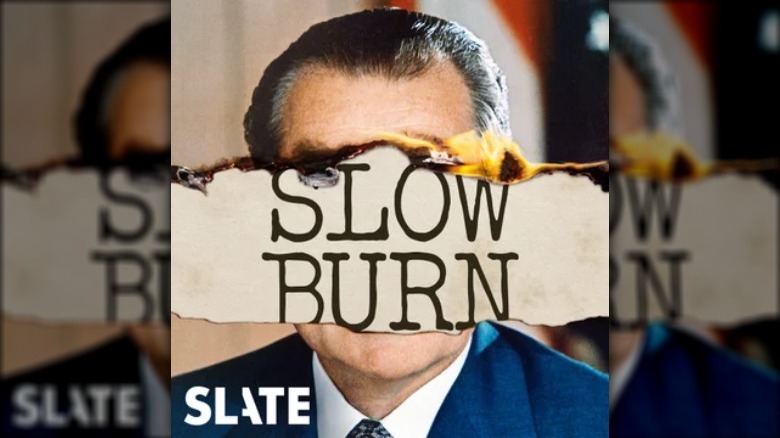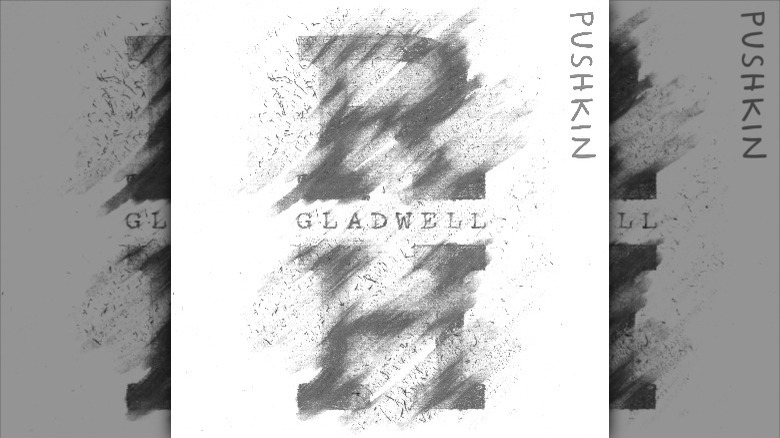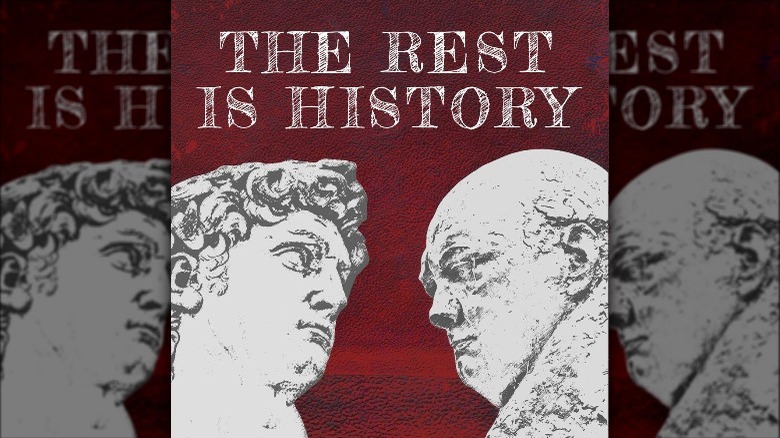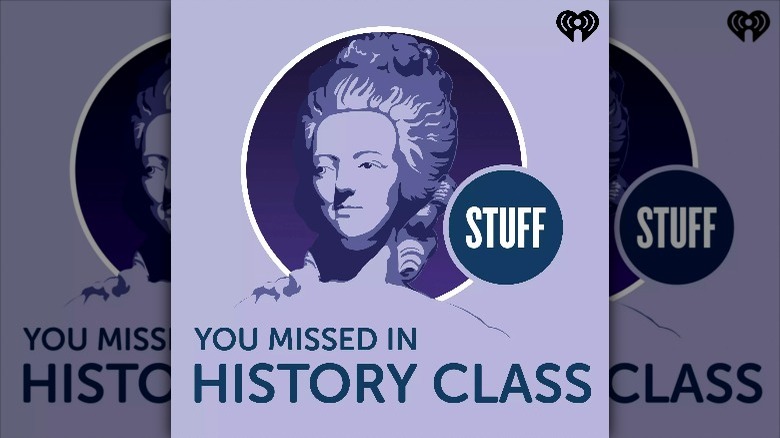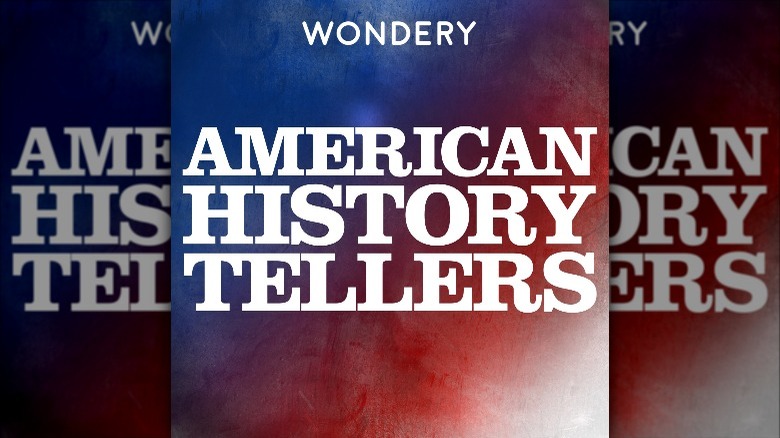The Best History Podcasts Of 2022
According to Martin Luther King Jr., "Instead of making history, we are made by history" (via The Washington Post). Nevertheless, though the tendrils of the past are everywhere in current affairs and modern discourse, history as a subject can seem like an alien world. As the novelist L. P. Hartley noted in the prologue to his novel "The Go-Between," published in 1913: "The past is a foreign country: They do things differently there."
So how do we make sense of the past and approach it in a way that helps us, in the present, shape the future? Most modern education systems include the subject "history" as part of their curriculum. But there is only so much that a young mind can take in over the course of a school life — and who is to say that the tellings on offer really offer a true and accurate reflection of the past? Perhaps there are multiple viewpoints, interpretations, and retellings of our collective past that are worth hearing outside of the classroom?
Luckily for people interested in history today, there is a plethora of options available when it comes to uncovering the past, from our ancient ancestors to the finer points of what recently counted as current affairs. And, besides books, one of the most powerful of these is podcasts, which offer a range of perspectives on the events that shaped the world today. Here are the most popular and critically acclaimed history podcasts of 2022 you definitely need to bookmark.
Dan Carlin's Hardcore History
In many ways the godfather of the history podcast scene, "Dan Carlin's Hardcore History" remains as well-loved today as when it first made a splash on the podcast scene back in 2006. The series began in July of that year, with a 16-minute episode comparing popular responses to Alexander the Great and Adolf Hitler. And in the months that followed Carlin proved he could turn his eye to any historical subject and illuminate it for his growing global audience.
However, in the years since, the podcast has undergone a significant evolution. Early episodes would typically tackle their subjects within the timeframe of a typical radio show — under an hour, in most cases. But the lengths of the podcasts Carlin releases have gradually increased, so that in 2022, the latest episode, a forensic examination of the Atlantic Slave Trade, is more than five-and-a-half-hours long.
Though episodes of "Hardcore History" are frustratingly few and far between, Carlin also touches base with his listenership more regularly through the accompanying "Hardcore History: Addendum" series. The supplementary show blends supporting material and offcuts from the main podcast with interviews and other tidbits to keep listeners entertained.
The deep-dive style of Carlin's work remains extremely popular and hugely influential, with fellow podcaster Paul Cooper saying Carlin aces the form, according to The Guardian. John Phipps writing for The Spectator believes "Hardcore History" is the best podcast out there and admits it's the only thing that can bring together his grandmother and younger brother. In addition, the podcast has won or been nominated for multiple awards.
You're Wrong About
In school, many of us are taught that history is the definitive story of the past; that how things are told to us is the real way things happened, and that there is a proper way to respond to and think about them.
The popular podcast "You're Wrong About," which launched in May 2018, is all about refuting this idea. Rather than relay historical events in the most familiar way possible, host Sarah Marshall and her co-host Michael Hobbes — who left the podcast in October 2021 to be replaced by a series of guest hosts (via Vulture) — seek to debunk the prevailing narratives around prominent stories from both the distant and recent past.
As described in a lengthy New Yorker profile from October 2020, the podcast's raison d'etre is to go against the grain in terms of how the media in general represents events such as the O.J. Simpson murder trial, the Satanic Panic of the 1980s, and the Enron banking scandal. The framing of the discussion between the pair is perhaps the reason for the show's success. Per the same source, for each episode one host or guest is the researcher, while the other approaches the subject from a position of ignorance, mirroring the experience of the listener. It is a potent formula, with the podcast growing in popularity to receive around 2.5 million downloads a month by the time of the New Yorker profile and iHeart's 2022 Podcast of the Year, reports The Hollywood Reporter.
In Our Time
Before podcasting, of course, there was radio. While in many cases the content offered by podcasts and traditional radio are similar, new technology that allows for downloading and on-demand listening has vastly improved the listener experience of many long-running radio shows.
One of these is "In Our Time," the BBC radio show first launched by British writer and broadcaster Sir Melvyn Bragg way back in 1998. The format is simple: Bragg interviews a panel of experts about a specific subject, such as The Manhattan Project or the Knights Templar, introducing the subject to a general listenership while also delving deep into the issues surrounding it that compel academics in the field. Impressively, the show also goes out live on BBC radio each week, with Bragg famously shepherding his guests away from digressions or areas of the subject that radio audiences may find ungraspable amid the show's galloping tempo.
The podcast version often also includes extra material from Bragg and his panel of expert guests. These sections address aspects of the subject they were unable to cover adequately during the terse 45-minute runtime of the live show, or which were perhaps too niche for a general audience but which downloaders looking for an introduction to a new subject would appreciate. As noted in a glowing Guardian review in 2011, the format and vast archive — which covers far more than history — make "In Our Time" a more valuable repository for knowledge than ever before, while The New Yorker praises the show's escapist qualities.
Fall of Civilizations
That history is sprawling, epic, and open to countless interpretations makes it a perfect subject for long-form podcasting. And with so many stories to be told, there is obviously room for multiple podcasts that tackle weighty subjects over the course of several hours, letting listeners lose themselves in the stories on offer.
Enter "Fall of Civilizations" then, a podcast launched in 2019 by creator Paul Cooper. Each episode — the length of which is typically between one and three hours — tackles the story of an ancient civilization's seemingly inevitable collapse, beginning with that of Roman Britain and more recently telling the story of the Bagan Empire of Myanmar (formerly Burma). Per Open Culture, the focus on downfall emerges from Cooper's interest in ancient ruins, a subject in which he is an expert. The outlet goes on to say Cooper is a master storyteller, engaging listeners by taking them on a journey through history.
And like "In Our Time," listeners have praised "Fall of Civilizations" for offering a source of escapism, even as certain aspects of the stories the podcast tells mirror some current events in the present day. Speaking to The Guardian, Cooper explained, "I get a lot of comments from people saying they have found it really helpful over the lockdown, especially because the show vaults across the world between episodes." Cooper spins an immersive tale that will stay lodged in your memory for days after listening. And, as the podcast's website notes, programming has topped the British podcast charts, with some 40 million listens since its launch.
Bad Gays
The hugely popular "Bad Gays" podcast, which is hosted by Huw Lemmey and Ben Miller, emerged from an interesting insight. Lemmey and Miller realized that whereas for heroic queer figures such as Oscar Wilde and Alan Turing their homosexuality has become an essential part of their identity in popular culture, for more complex historical figures such as Alexander the Great and J. Edgar Hoover, their sexual identity often exists as a mere footnote in the stories of their lives.
Lemmey and Miller launched "Bad Gays" in 2019 with an episode detailing the life of the first openly gay politician, the Nazi leader Ernst Röhm, despite many around them arguing that there wasn't likely to be an audience for deep dives into the history of evil and problematic gays, per The L.A. Times. The same source claims that in May 2022, the podcast reached the milestone of over one million downloads, while its popularity has already led to the publication of a book of the same name. In a glowing review, Vox commended the podcast for its humor and ability to keep listeners hanging on while the mystery unfolds.
But "Bad Gays" isn't just about fulfilling listeners' morbid fascination with villains from yesteryear. As the hosts told Vice in a 2019 interview, by taking the time to tell the stories of under-examined, less-admirable gay figures from history, "we can learn a lot about how today's gay identities were built, what they reacted to, and how their gayness intersected with race and class."
You're Dead to Me
Typically, history as it is taught in classrooms can be a dry, serious affair that turns students off. But a recent podcast launched by the BBC has proven that doesn't have to be the case. "You're Dead To Me," the first episode of which was released in September 2019, is a radio show and podcast that blends history with the best contemporary comedy to tackle complex subjects in an informative, entertaining way.
Hosted by the author and historian Greg Jenner, the show welcomes guests from both academia and the world of comedy — the first episode saw British national treasure Stephen Fry paired with the historian Bodie Ashton to explore the life of Frederick the Great of Prussia — for a serious conversation that is as concerned with conveying the facts as it is with making its listeners laugh.
And it's a winning combination, with Edinburgh University's Retrospect Journal praising the podcast's academic rigor in its treatment of subjects such as abolitionist and activist Harriet Tubman, as well as wider topics, such as queer history. Per the same source, the podcast has been an immense success, landing atop the Apple Podcasts chart in its home country with over 27 million downloads by early 2021. The podcast has also been shortlisted that same year at the British Podcast Awards.
Slow Burn
Slate is a website known for its interesting and provocative takes on current affairs, society, culture, and history. So it will come as no surprise to learn that their recent podcast series, "Slow Burn," has so far tackled seven contentious subjects from the not-too-distant past — and, indeed, the present — in a manner that is both entertaining and thought-provoking.
Launched in 2017 with a series exploring the finer points of the notorious Watergate scandal, "Slow Burn" gained an immediate buzz, as noted by USA Today. Since then, the podcast has amassed a huge following in the years since thanks to insightful investigations into the murders of Tupac Shakur and The Notorious B.I.G., white supremacist David Duke, and the Clinton-Lewinsky scandal.
Their seventh series, which began on June 1, 2022, focuses unflinchingly on the prescient subject of Roe v. Wade. It has been their most acclaimed series so far, winning numerous accolades, including the Apple Podcasts Show of the Year award (via Slate).
Revisionist History
As with many history podcasts, it's clear there is a huge audience for shows that seek to correct our shared understanding of historical events. However, much of what history enthusiasts have been listening to in 2022 might not have been possible without the existence of "Revisionist History," a high-profile, long-running podcast that in many ways set the template for the genre.
Launched in 2016, "Revisionist History" is hosted by Malcolm Gladwell, the well-known journalist who first made his name with The New Yorker before authoring numerous books focusing on crime, psychology, and history. As noted by The New York Times, Gladwell's brief in "Revisionist History" is to challenge our assumptions around a given historical subject, and to remind us that the past — whether that takes the form of world events, or even a single record by a musician that has been unfairly maligned — is often the victim of our collective misunderstanding. When the podcast launched with just a teaser trailer, listeners immediately took it to No. 1 on Apple's charts.
As well as being of interest to general listeners and history enthusiasts, journals such as Teaching Sociology have praised "Revisionist History" as a valuable resource for educators looking for tools through which to impart to their students that history itself may not be as cut and dried as it first appears in textbooks. The podcast has also been the winner and nominee for multiple awards.
The Rest Is History
"The Rest Is History" podcast was announced October 2020, with the first episode exploring the concept of greatness, which has become a recurring theme throughout the podcast since. In the episodes that follow, the podcast's hosts, historians Tom Holland and Dominic Sandbrook, have compared Donald Trump to Julius Caesar and Richard Nixon, covered Pompeii and the cause of World War I, and addressed both historical and modern conspiracy theories, as well as a bevy of other topics. Episodes of the show, which now number nearly 300, are published multiple times a week, meaning that dedicated listeners can get a regular fix of history and analysis.
As described in The New Statesman, "The Rest Is History" is seemingly random in its choice of subjects, but that is part of its appeal, making it an exciting and unpredictable listen.
Holland and Sandbrook claim they are tackling the entirety of human history over the course of the project — an ambitious claim, but one which means that "The Rest Is History" is likely to run and run, and be worth checking in with for years to come.
Stuff You Missed in History Class
While many podcasts have ingenious hooks to draw a listener in, "Stuff You Missed in History Class," the roots of which go all the way back to 2008, is notable for its simplicity.
It is perhaps a truism that most people past high school age wish they had retained more of the information that was imparted to them during their formative years but also accept that, much of the time, the way knowledge was imparted was perhaps not conducive to long-term memory retention. That's where "Stuff You Missed in History Class" comes in, proving — through explorations of the lives of such fringe figures as news network founder Paul Julius Reuters and the history of food safety as it relates to space travel, for instance — that the topics you were taught weren't perhaps the most interesting ones in the first place. As described in a hugely positive review in The Kansas State Collegian, hosts Tracy Wilson and Holly Frey specialize in researching subjects outside of the typical school curriculum to provide a free-wheeling and hugely enjoyable dive into our collective past.
Per Forbes, by 2020 the podcast was garnering more than 10 million downloads a month, with the show attracting fans thanks to the show's high-level research, as well as the chemistry between its two hosts.
American History Tellers
"American History Tellers" launched in January 2018 and instantly hit the top spot on the iTunes podcast chart, according to The Dallas Observer. The podcast's host is Lindsay Graham, a marketing director at the Southern Methodist University, who in the years that have followed has built a loyal following as he delves into a variety of subjects, working with researchers, scriptwriters — as well as whoever is responsible for the podcast's immersive sound effects — to tell the history of America in a way that is both memorable and informative.
From prohibition to the gold rush, from the Cold War to the history of Stonewall, "American History Tellers" offers a catchy and utterly addictive look at each subject, whether that be a breezy single episode summary or a season that lasts for many weeks. Outlets such as USA Today have praised the podcast, highlighting Graham's voice as a particular hook. But the true appeal of "American History Tellers" is far from superficial; The Comeback notes that the podcast digs deep into its subjects and rewards listeners who give it their full attention.

